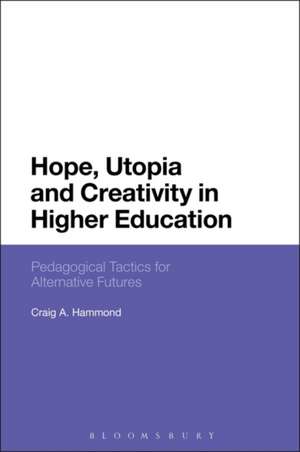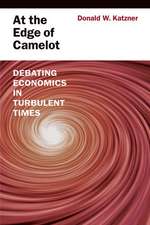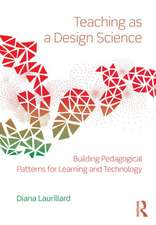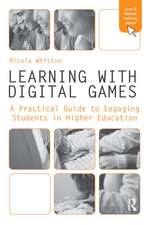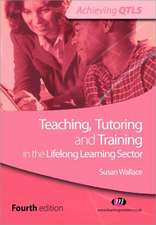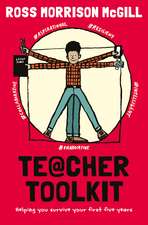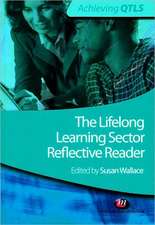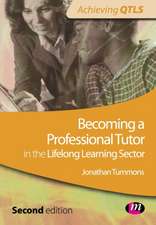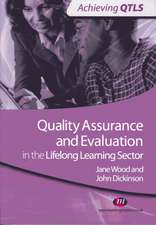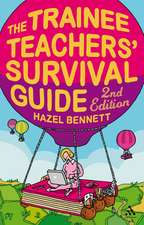Hope, Utopia and Creativity in Higher Education: Pedagogical Tactics for Alternative Futures
Autor Dr Craig A. Hammonden Limba Engleză Hardback – 11 ian 2017
| Toate formatele și edițiile | Preț | Express |
|---|---|---|
| Paperback (1) | 236.74 lei 6-8 săpt. | |
| Bloomsbury Publishing – 25 iul 2018 | 236.74 lei 6-8 săpt. | |
| Hardback (1) | 772.58 lei 6-8 săpt. | |
| Bloomsbury Publishing – 11 ian 2017 | 772.58 lei 6-8 săpt. |
Preț: 772.58 lei
Preț vechi: 1112.20 lei
-31% Nou
Puncte Express: 1159
Preț estimativ în valută:
147.84€ • 152.75$ • 122.98£
147.84€ • 152.75$ • 122.98£
Carte tipărită la comandă
Livrare economică 20 martie-03 aprilie
Preluare comenzi: 021 569.72.76
Specificații
ISBN-13: 9781474261654
ISBN-10: 1474261655
Pagini: 224
Ilustrații: 2 bw illus
Dimensiuni: 156 x 234 x 2 mm
Greutate: 0.45 kg
Editura: Bloomsbury Publishing
Colecția Bloomsbury Academic
Locul publicării:London, United Kingdom
ISBN-10: 1474261655
Pagini: 224
Ilustrații: 2 bw illus
Dimensiuni: 156 x 234 x 2 mm
Greutate: 0.45 kg
Editura: Bloomsbury Publishing
Colecția Bloomsbury Academic
Locul publicării:London, United Kingdom
Caracteristici
Explores learner comments and evaluations, affording a transparent and democratic snapshot of the challenges, possibilities and impacts of engaging with a 'utopian pedagogy'
Notă biografică
Craig A. Hammond is Senior Lecturer in the Department of Education at Liverpool John Moores University, UK.
Cuprins
Acknowledgements 1. Introduction: Critical Pedagogies - Horizons of Possibility Part I: Tactics: Conceptualising Hope, Utopia & Creativity 2. Ernst Bloch, Hope and Utopia: The Stuff of Possibility 3. Roland Barthes: Punctum! The Death of the Author 4. Gaston Bachelard: Poetics, Space & Daydreaming Part II: Pedagogical Strategies for Creative Possibilities 5. Dérive and Détournement: Pedagogical Strategies for Creative Engagement 6. Bye Bye Badman: The Redemption of Hope through Popular Culture 7. The Wisdom of the Crowd: Liberating Creativity Part III: Learner Stories, Reflections and Projections 8. A Garland of Rhythms 9. Encounters, Stories, Connections10. Beyond the Trace: Reflections from Past Learners 11. Conclsion Elpis/Eidos - Elpeidetics: Hopeful Visions? Appendix 1: Student Contact Emails Appendix 2: Student Information, Questionnaire and Permissions BibliographyIndex
Recenzii
Given the widespread concern with diversity and inclusion in higher education settings in recent years, professors of theology and religious studies with an appreciation for critical pedagogies will benefit from reflecting on the theoretical ideas and pedagogical strategies offered here [in Hope, Utopia and Creativity in Higher Education].
Hammond's is a seriously scholarly treatise for serious times. Theory is deeply rooted in accounts of day-to-day teaching and learning involving students exposed to progressive pedagogical principles deriving from Bloch, Barthes and Bachelard. It refuses education's neoliberal Brave New World by promoting a compellingly militant and utopian vision of democratic and creative education in action.
Hope, Utopia and Creativity in Higher Education pierces a hole through the wall of officially approved procedures, thus inspiring students to think critically and independently rather than become blatant consumers of a pre-processed knowledge. This book reflects Hammond's genuine interest in an active change in the ever-more controlled world of higher education and beyond.
Craig Hammond weaves an authentic, accessible and fascinating exploration of using critical pedagogy applying utopian and situationist thinking to set the terms for critical interventions in strategy and tactics for curriculum development and teacher-student enrichment in the learning context. He thereby brings the character of the 'Not Yet' to the classroom now. Combining autobiography and established practice with theoretical insight and evidence, Hammond skilfully presents his vision. He has produced a thought-provoking and practice-provoking text that will benefit both the student and the experienced pedagogue. This is a significant and distinct contribution to the corpus of critical pedagogy.
Importantly, this is not only a theoretical work; the significance of this book is strongly tied to the examples provided by the author of utopian pedagogical praxis. The module hand book for instructors is also a valuable resource to help students be creative learners and collaborators in their own educational processes.
A candid, courageous and very thought-provoking book. Craig Hammond provides a fascinating account of how theory can be harnessed collaboratively by teachers and students, through the vehicles of creative autobiography and peer assessment, to inform and construct a model of critical pedagogy that not only calls into question didactic approaches to teaching but proposes a radical, utopian alternative in which students become genuine co-constructors of knowledge production.
Hammond's book diffidently provides a practical guiding scholarly text for academics to incorporate 'another' typology of education ... The book certainly challenges the way the reader thinks about the process of knowledge acquisition and will guide those in higher education to join the contemporary revolution in education.
Hammond's is a seriously scholarly treatise for serious times. Theory is deeply rooted in accounts of day-to-day teaching and learning involving students exposed to progressive pedagogical principles deriving from Bloch, Barthes and Bachelard. It refuses education's neoliberal Brave New World by promoting a compellingly militant and utopian vision of democratic and creative education in action.
Hope, Utopia and Creativity in Higher Education pierces a hole through the wall of officially approved procedures, thus inspiring students to think critically and independently rather than become blatant consumers of a pre-processed knowledge. This book reflects Hammond's genuine interest in an active change in the ever-more controlled world of higher education and beyond.
Craig Hammond weaves an authentic, accessible and fascinating exploration of using critical pedagogy applying utopian and situationist thinking to set the terms for critical interventions in strategy and tactics for curriculum development and teacher-student enrichment in the learning context. He thereby brings the character of the 'Not Yet' to the classroom now. Combining autobiography and established practice with theoretical insight and evidence, Hammond skilfully presents his vision. He has produced a thought-provoking and practice-provoking text that will benefit both the student and the experienced pedagogue. This is a significant and distinct contribution to the corpus of critical pedagogy.
Importantly, this is not only a theoretical work; the significance of this book is strongly tied to the examples provided by the author of utopian pedagogical praxis. The module hand book for instructors is also a valuable resource to help students be creative learners and collaborators in their own educational processes.
A candid, courageous and very thought-provoking book. Craig Hammond provides a fascinating account of how theory can be harnessed collaboratively by teachers and students, through the vehicles of creative autobiography and peer assessment, to inform and construct a model of critical pedagogy that not only calls into question didactic approaches to teaching but proposes a radical, utopian alternative in which students become genuine co-constructors of knowledge production.
Hammond's book diffidently provides a practical guiding scholarly text for academics to incorporate 'another' typology of education ... The book certainly challenges the way the reader thinks about the process of knowledge acquisition and will guide those in higher education to join the contemporary revolution in education.
